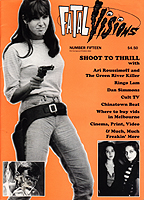
Cyberpunk is a subgenre of science fiction in a dystopian futuristic setting that tends to focus on a "combination of lowlife and high tech", featuring futuristic technological and scientific achievements, such as artificial intelligence and cyberware, juxtaposed with societal collapse, dystopia or decay. Much of cyberpunk is rooted in the New Wave science fiction movement of the 1960s and 1970s, when writers like Philip K. Dick, Michael Moorcock, Roger Zelazny, John Brunner, J. G. Ballard, Philip José Farmer and Harlan Ellison examined the impact of drug culture, technology, and the sexual revolution while avoiding the utopian tendencies of earlier science fiction.

Horror is a film genre that seeks to elicit fear or disgust in its audience for entertainment purposes.
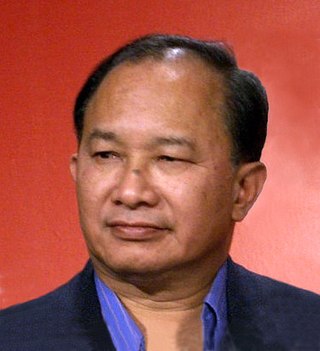
John Woo Yu-Sen is a Hong Kong filmmaker, known as a highly influential figure in the action film genre. He is a pioneer of heroic bloodshed films and the gun fu genre in Hong Kong action cinema, before working in Hollywood films. He is known for his highly chaotic "bullet ballet" action sequences, stylized imagery, Mexican standoffs, frequent use of slow motion and allusions to wuxia, film noir and Western cinema.
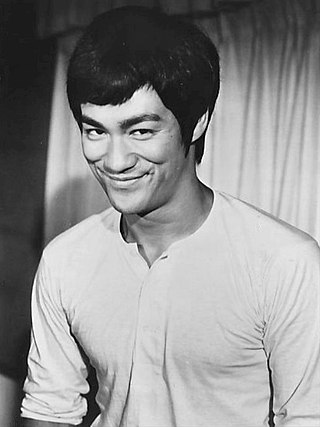
Bruce Lee was a Hong Kong-American martial artist and actor whose career spanned Hong Kong and the United States. He was the founder of Jeet Kune Do, a hybrid martial arts philosophy drawing from different combat disciplines that is sometimes credited with paving the way for modern mixed martial arts (MMA). Lee is considered by some commentators and martial artists to be the most influential martial artist of all time and a pop culture icon of the 20th century, who bridged the gap between East and West. He is credited with promoting Hong Kong action cinema and helping to change the way Chinese people were presented in American films.

Action film is a film genre in which the protagonist is thrust into a series of events that typically involve violence and physical feats. The genre tends to feature a mostly resourceful hero struggling against incredible odds, which include life-threatening situations, an indestructible villain, or a pursuit which usually concludes in victory for the hero.

Jackie Chan is a Hong Kong actor, filmmaker, martial artist, and stuntman known for his slapstick acrobatic fighting style, comic timing, and innovative stunts, which he typically performs himself. Before entering the film industry, he was one of the Seven Little Fortunes from the China Drama Academy at the Peking Opera School, where he studied acrobatics, martial arts, and acting. Chan has been acting since the 1960s, performing in more than 150 films. He is one of the most influential action film stars of all time.

Shaw Brothers (HK) Ltd. was the largest film production company in Hong Kong, and operated from 1925 to 2011.

Wong Kar-wai is a Hong Kong film director, screenwriter, and producer. His films are characterised by nonlinear narratives, atmospheric music, and vivid cinematography involving bold, saturated colours. A pivotal figure of Hong Kong cinema, Wong is considered a contemporary auteur, and ranks third on Sight & Sound's 2002 poll of the greatest filmmakers of the previous 25 years. His films frequently appear on best-of lists domestically and internationally.

The cinema of Hong Kong is one of the three major threads in the history of Chinese language cinema, alongside the cinema of China and the cinema of Taiwan. As a former British colony, Hong Kong had a greater degree of political and economic freedom than mainland China and Taiwan, and developed into a filmmaking hub for the Chinese-speaking world.
Heroic bloodshed is a genre invented by Hong Kong action cinema revolving around stylized action sequences and dramatic themes, such as brotherhood, duty, honour, redemption, and violence that has become a popular genre used by different directors worldwide. The term heroic bloodshed was coined by editor Rick Baker in the magazine Eastern Heroes in the late 1980s, specifically referring to the styles of directors John Woo and Ringo Lam. Baker defined the genre as "a Hong Kong action film that features a lot of gun play and gangsters rather than kung fu. Lots of blood. Lots of action." Heroic bloodshed films often feature gun fu action sequences.
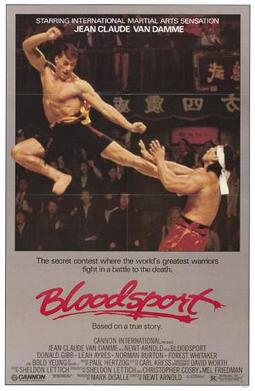
Bloodsport is a 1988 American martial arts sports action film directed by Newt Arnold and starring Jean-Claude Van Damme, Leah Ayres, Forest Whitaker, Donald Gibb, Roy Chiao and Bolo Yeung. The film centers on Frank Dux, a United States Army Captain and ninjutsu practitioner, who competes in an underground full-contact martial arts tournament called the Kumite in Hong Kong. Based on Dux's real-life claims the movie was marketed as a true story. It was one of Van Damme's first lead roles and showcased his abilities, launching his career as a mainstream action star.
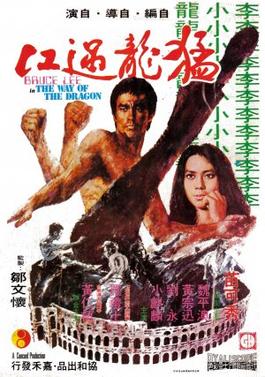
The Way of the Dragon is a 1972 Hong Kong martial arts action comedy film co-produced and directed by Bruce Lee, who also stars in the lead role. This is Lee's only complete directorial film and the last one released during his lifetime. The film co-stars Nora Miao, Robert Wall, Wei Ping-ou and Chuck Norris.

Donnie Yen Ji-dan is a Hong Kong actor, martial artist, and action director. He is regarded as one of Hong Kong's top action stars.
Bruceploitation is an exploitation film subgenre that emerged after the death of martial arts film star Bruce Lee in 1973, during which time filmmakers from Hong Kong, Taiwan and South Korea cast Bruce Lee look-alike actors ("Lee-alikes") to star in imitation martial arts films, in order to exploit Lee's sudden international popularity. Bruce Lee look-alike characters also commonly appear in other media, including anime, comic books, manga, and video games.
Hong Kong action cinema is the principal source of the Hong Kong film industry's global fame. Action films from Hong Kong have roots in Chinese and Hong Kong cultures including Chinese opera, storytelling and aesthetic traditions, which Hong Kong filmmakers combined with elements from Hollywood and Japanese cinema along with new action choreography and filmmaking techniques, to create a culturally distinctive form that went on to have wide transcultural appeal. In turn, Hollywood action films have been heavily influenced by Hong Kong genre conventions, from the 1970s onwards.

William Cheung or Cheung Cheuk-hing is a Hong Kong Wing Chun kung fu practitioner and currently the Grandmaster of his lineage of Wing Chun, entitled Traditional Wing Chun (TWC). He also heads the sanctioning body of TWC, the Global Traditional Wing Chun Kung Fu Association (GTWCKFA). He is the recipient of a Masters Award for lifetime achievement in Kung Fu from Martial Arts Australia.
The Hong Kong Film Award for Best Actress is an award presented annually at the Hong Kong Film Awards (HKFA). It is given to honour an actress who has delivered an outstanding performance in a Hong Kong film. The 1st Hong Kong Film Awards ceremony was held in 1982, with no formal nomination procedure established; the award was given to Kara Hui for her role in My Young Auntie. After the first award ceremony, a nomination system was put in place whereby no more than five nominations are made for each category and each entry is selected through two rounds of voting. Firstly, prospective nominees are marked with a weight of 50% each from HKFA voters and a hundred professional adjudicators, contributing towards a final score with which the top five nominees advance to the second round of voting. The winner is then selected via a scoring process where 55% of the vote comes from 55 professional adjudicators, 25% from representatives of the Hong Kong Performing Artistes Guild and 20% from all other HKFA Executive Committee Members.
Leong Po-Chih is a British-Chinese film director. He has worked in England, Hong Kong, and the United States.

The Heroic Ones is a 1970 Hong Kong Shaw Brothers Studio martial arts film directed by Chang Cheh. It was originally released on 14 August 1970 in Hong Kong and was one of the top grossing Hong Kong films between the years of 1970 and 1972.
Coconuts Tabloid Media is a multi-national media company across Hong Kong that publishes a network of local city websites and documentary videos online. The company serves ten cities and countries across South East Asia, namely Bangkok, Manila, Hong Kong, Singapore, Kuala Lumpur, Jakarta, Bali and Yangon, covering local news and cultural trends. Coconuts Media is using social media and video platforms to increase its reach. In addition to English, the company produces content in Thai and Bahasa Indonesia.
